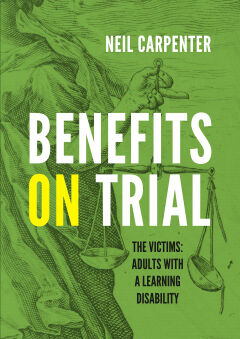This book focuses on the way the Department for Work and Pensions (DWP) treats people with a learning disability.
There are over 1,000,000 adults with a learning disability in the UK. For their benefits, they have to battle with the Department for Work and Pensions whose system, with built-in hurdles, is loaded against them.

Benefits on Trial describes the DWP’s treatment of six people which leaves them deep in relative poverty. The book explores the strain not just on their finances but also, inevitably, on their mental health.
Two of them, Danny and Thomas, figured prominently in his previous book Austerity's Victims. The others: Ben, Jon, Tony and Denise are also treated by the DWP in a way which pushes them deep into relative poverty. Benefits on Trial also examines, however, what happens when they appeal to an independent tribunal: the injustice at the hands of the DWP is set right, with its decisions overturned by a massive margin.
Relative poverty is defined as when a household has less than 60% of the UK median household income. The people in the book being rejected for Personal Independence Payment (PIP) on average are left below 30% of the UK median. The book not only explores the strain on their finances but also, inevitably, on their mental health. For example, Denise suffers panic attacks and Jon’s mother is reduced to saying: “There were times when I was so low that I started to wish that Jon and I weren’t here. ”
Benefits on Trial also examines what happens when an appeal is made to an independent tribunal. The injustice at the hands of the DWP is rectified, with its decisions overturned by a substantial margin either at a tribunal or through an out-of-court settlement. All the people in the book who appealed received no points whatsoever – and, inevitably, no award – when they applied for PIP. At the tribunal stage, an average of over 21 points is given, and in four cases, an enhanced award is made. Tony’s case, with 35 points, is particularly striking.
Thus, the DWP stands exposed by the evidence in this book. Only one conclusion is possible: the current benefits system, with its distortions and dirty tricks, does not need minor tinkering; instead, it needs to be replaced by a system that takes fair assessment as its guiding principled.
As with the author's previous book, the aim is not to generate a profit from sales but to highlight the unfair treatment of people with a learning disability by the DWP.
Available to order from your local bookshop and on Amazon
disability, social care, social justice, tax and benefits, England, Books